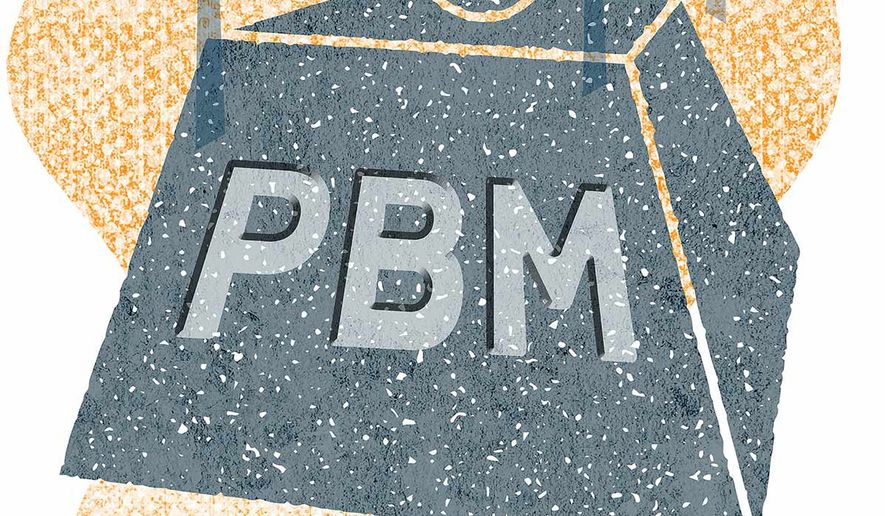OPINION:
The Federal Trade Commission now has a golden opportunity to expose why so many Americans are getting fleeced on prescription medications.
The agency has just voted unanimously to conduct an inquiry into the business practices of America’s silent medical middlemen, giant corporations known as “pharmacy benefit managers.” Such a probe is long overdue. Drug makers are often painted as the villains for high drug prices, but PBMs are the real profiteers. Until now, they have managed to remain mostly invisible. The FTC inquiry will change that, much to the benefit of patients nationwide.
The three biggest PBMs, which own or are owned by the nation’s largest health insurers, control nearly 80% of the prescription medicine market. One of their principal jobs is to negotiate discounts with drug companies. And they’re aces at it — which is hardly surprising, given their market power to decide not just prices, but which drugs are covered by insurance and which ones aren’t. PBMs are gatekeepers to the prescription-buying public, so drug companies have to play by their rules or face seeing their products shut out of coverage.
PBMs shroud their negotiations in secrecy. They aren’t legally bound to operate transparently, nor is there any requirement that discounts they negotiate get passed on directly to patients. These discounts increased from $89.5 billion in 2016 to $175 billion in 2019. This leaves sick Americans paying needlessly high prices for life-saving medications while PBMs and their insurer partners get rich. And they do. Very.
Suppose the retail price for a drug is $500, and a patient’s insurance company obligates him to pay 20% of the cost. That means he has to pay $100. But if the PBM secured the drug for $300 — a fairly typical discount — the patient’s share wouldn’t drop to $60, as you might expect. He’d still be billed $100 — and wouldn’t have any idea that his insurer picked his pocket and lined its own. With the insurer and the PBM under the same ownership, it’s a cozy arrangement.
PBM profits are soaring. They and other non-manufacturers in the drug supply chain managed to pocket 51% of the $686.9 billion spent on prescriptions in 2020. That’s quite a jump from the 37.2% middleman share in 2013 — and not a bad haul for paper-pushing entities that produce nothing.
Rising co-pay and co-insurance costs have led three out of every 10 adults to stop taking their medications as prescribed, according to a recent poll by the Kaiser Family Foundation. By making prescriptions less affordable, the insurer/PBM nexus drives up overall health costs as patients skip doses and end up needing expensive hospital stays.
It took a while for the FTC to get to yes on launching this inquiry, which begins as a basic study of PBM business practices but could lead to enforcement action down the road as the truth comes out. Cozy relationships and self-dealing with affiliated pharmacies and insurers and discriminatory practices against independent pharmacies are now the norm. That much became apparent in hours of testimony from pharmacists and patients as the agency was considering whether to launch its study.
These patterns of patient abuse have already been setting off alarm bells in state capitals. In Michigan, for example, Gov. Gretchen Whitmer recently signed legislation to regulate PBMs. The goal, she said, is to “lower inflated costs” and give residents “access to all the information about the back-end cost and profit of their prescription medication.”
Florida’s Senate responded to complaints about PBMs by unanimously passing a bill that would subject them to state oversight. New York is doing the same; a new law will require PBMs to register with the state and disclose rebates or discounts they get from the drug companies.
While it’s encouraging to see states stepping up, the FTC inquiry offers the best hope for a comprehensive review of PBM practices nationwide. As patients have been feeling the squeeze on prescription costs, PBMs and their affiliated insurers and pharmacies have been secretively maximizing their opportunities for profit. When consumers learn what’s really going on, they will know exactly where to direct their outrage.
• Peter J. Pitts, a former FDA associate commissioner and member of the United States Senior Executive Service, is president of the Center for Medicine in the Public Interest and a visiting professor at the University of Paris School of Medicine.




Please read our comment policy before commenting.